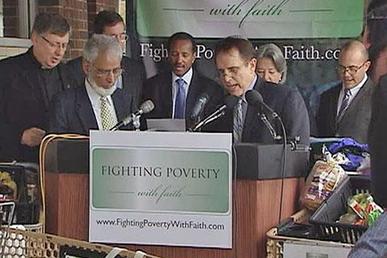
A group of Jewish, Christian and Muslim religious leaders pretended to be poor, as they went shopping in a Washington supermarket this week. Their aim was to protest proposed cuts to a government food subsidy program for tens of millions of Americans.
Rabbi Steve Gutow led the way.
An imam went down the cereal aisle.
And a priest got some help with numbers.
And there was a challenge - spend no more than $31.50. That is the average sum distributed by the government's Supplemental Nutritional Assistance Program. It is popularly known by its former name, Food Stamps.
The federally-funded program is for Americans living in what is known as "food insecure households."
How many Americans live that way?
"Forty-eight million of us. That's not 48,000, that's not 488,000, that's not 4.8 million. Forty-eight million of us who struggle under the threat of hunger every day," said Rabbi Steve Gutow of the Jewish Council for Public Affairs.
These clergy plan to live on the food stamp budget for one week. And they are calling on other Americans to do the same to protest proposed cuts to the program's 2012 budget.
Participation in the program has increased by more than 60 percent since the 2008 recession. Critics say the program does not reduce hunger.
Reverend Canon Peg Chemberlin used to live on food stamps and said Americans face a decision.
"Will we be a nation of compassion, the one God calls us to? Or will we be a nation of greed?" asks Chemberlin.
Rabbi Gutow says poverty is not a popular topic for politicians.
"So they talk a lot about things that help the middle class. And they don't talk about things that help the poor," said Gutow.
But he said helping the poor is so ingrained in religious tradition that these leaders are left with no choice but to defend the food subsidy program.
imam: an Islamic leadership position (伊斯蘭教)對領導者的尊稱
ingrained: 根深蒂固的
US charges China over subsidies
Economists blast US corn ethanol program
US farm exports predicted to set record in 2011
(來源:VOA 編輯:Rosy)
